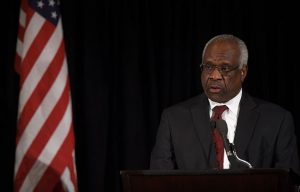
(AP Photo/Susan Walsh, Pool)
This wasn’t a unanimous opinion, and we’ll get to why in a second, but for now let’s celebrate the fact that the Supreme Court ruled that Duane Buck could not be put to death.
Duane Buck is a bad dude. He was convicted of murdering his girlfriend and her lover, as well as shooting his step-sister at point blank range.

Stand With Survivors: Legal Tools To Make A Real Difference This DVAM
Enhance your legal skills to advocate for survivors of intimate partner violence.
But in the penalty phase, his defense team put up a psychologist, Dr. Walter Quijano, who said that Buck was more likely to commit violent crimes in the future, because he is black. I say again, his defense team put that guy on the stand. Buck was sentenced to death.
Today, the Supreme Court ruled, 6-2 in Buck v. Davis, that Buck couldn’t be put to death behind that mess. John Roberts delivered the opinion of the Court, and found that Buck received ineffective assistance of counsel. If even Roberts can see that, I’m just going to assume I don’t have to explain it further to you guys.
Because “you guys” are not Clarence Thomas. And boy howdy did Thomas (with Alito joining) go full ends-justifies-the-means on this one. After criticizing the majority’s application of procedure (because he’s Clarence Thomas and he wakes up every day looking for evils the federal government has no right to stop), he argues that Buck’s counsel didn’t do anything materially wrong:
The Court’s application of the standard in Strickland v. Washington, 466 U. S. 668 (1984), is similarly misguided. In particular, the Court erroneously finds that petitioner’s claim satisfies Strickland’s second prong, which requires a defendant to show that his counsel’s mistake materially prejudiced his defense. Prejudice exists only when correcting the alleged error would have produced a “substantial” likelihood of a different result. Harrington v. Richter, 562 U.S. 86, 111–112 (2011). Here, the sentence of death hinged on the jury’s finding that petitioner posed a threat of future dangerousness. Texas’ standard for making such a finding is not difficult to satisfy: “The facts of the offense alone may be sufficient to sustain the jury’s finding of future dangerousness,” and “[a] jury may also infer a defendant’s future dangerousness from evidence showing a lack of remorse.” Buntion v. State, 482 S. W. 3d 58, 66–67 (Tex. Crim. App. 2016)

USCIS shift to electronic payments: What immigration firms need to know
As of October 2025, U.S. Citizenship and Immigration Services requires electronic payments for filing fees. Learn key updates, exemptions, and how firms can prepare.
Essentially, Thomas is saying that it was okay for Buck’s own defense lawyers to offer testimony that black people are dangerous because this black person is dangerous and, well, fry his ass. In Thomas’s world, any defense attorney could sabotage their own clients, and it would be okay because if they were truly innocent they wouldn’t need a competent defense.
I rarely bring up Thomas’s race when reading his opinions, because I rarely notice it. He’s just an asshole, the fact that he happens to be black is irrelevant. But here, Thomas’s own prejudices about how racism works jump off the page to me:
[T]he prosecution’s evidence of both the heinousness of petitioner’s crime and his complete lack of remorse was overwhelming. Accordingly, Dr. Quijano’s “de minimis” racial testimony, Buck v. Stephens, 2014 WL 11310152, *5 (SD Tex., Aug. 29, 2014), did not prejudice petitioner.
That’s just Thomas in a nutshell. All racism has a “de minimis” effect in Thomas’s world. It’s not that he doesn’t think racism exists, it’s that he thinks it can be overcome by sheer force of will and stubbornness. Racism never hurts anybody who doesn’t let it hurt them. Only weak-ass brothers and sisters think racism has more than a de minimis effect on their lives.
Maybe that’s true for Clarence Thomas. He’s overcome a lot of racism in his life, and now that he’s in the tree house, he doesn’t see one goddamn reason to throw down a ladder. He didn’t have one, why should anybody else need one?
But you’ll notice his assertion that “racial testimony… did not prejudice petitioner” is just that: a bald assertion. HE DOESN’T KNOW THAT. He doesn’t know what the sentencing jury was thinking when it heard the defense’s own EXPERT testify that black people were more dangerous. Maybe they thought “hogwash, that’s just racism.” But maybe they didn’t. MAYBE, the racist expert testimony served as confirmation bias for their own prejudiced views about which people are “dangerous.” Since we can’t know, maybe not having the racist testimony in the first place was the way to go?
Sure, the petitioner’s own actions put him at the mercy of the jury and whatever prejudices they brought to the box or were told about on the stand. Thomas spends a lot of time establishing that Buck was a horrible guy. Thomas seems to think that anybody could see that Buck was horrible regardless of race. Again, it’s an assertion backed up with no evidence that other people think about race the way Clarence Thomas wants them to think about race.
Thomas assumes that prejudiced testimony doesn’t influence people. The majority assumes that the defense should not offer testimony racially prejudiced against their own client. The majority’s assumption is race-neutral. Thomas’s assumption is steeped in his own theories about how prejudice and discrimination really work.
I’m not inclined to take Clarence Thomas’s word for it, any more than I’d be inclined to take John Roberts’s. Or Sonia Sotomayor’s, for that matter. I want the Court to try to take prejudice OUT of the justice system, not explain it away based on their pet theories of the de minimis effect of racism.
Buck v. Davis [Supreme Court Of The United States]
Elie Mystal is an editor of Above the Law and the Legal Editor for More Perfect. He can be reached @ElieNYC on Twitter, or at [email protected]. He will resist.